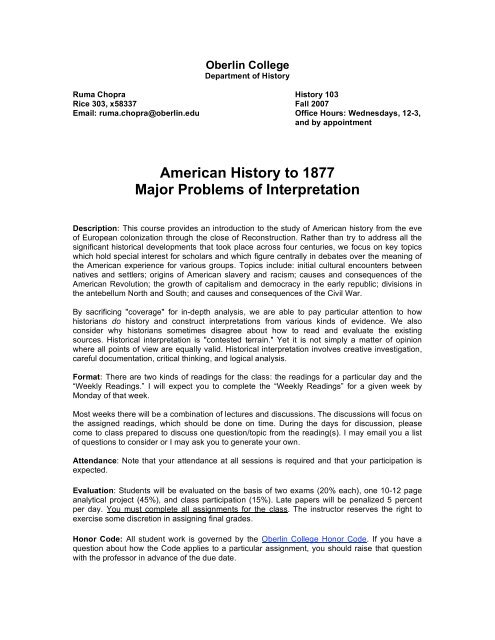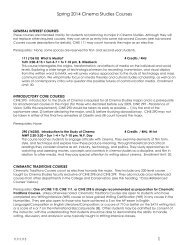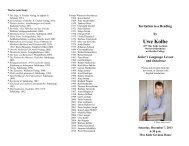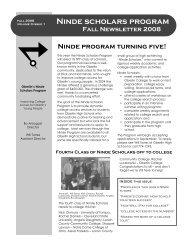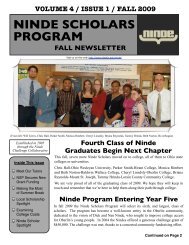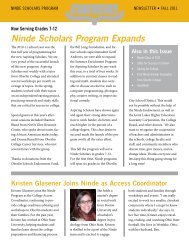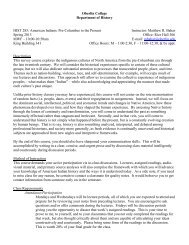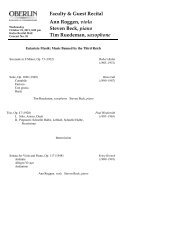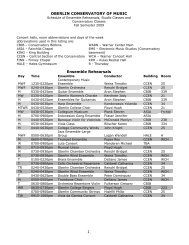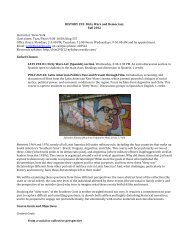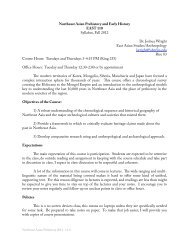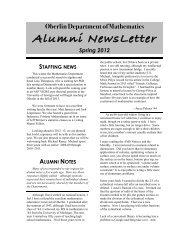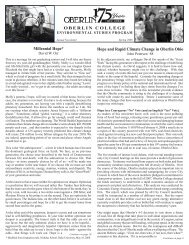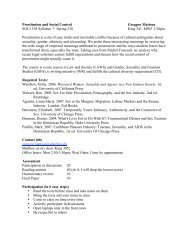American History to 1877 Major Problems of ... - Oberlin College
American History to 1877 Major Problems of ... - Oberlin College
American History to 1877 Major Problems of ... - Oberlin College
Create successful ePaper yourself
Turn your PDF publications into a flip-book with our unique Google optimized e-Paper software.
<strong>Oberlin</strong> <strong>College</strong><br />
Department <strong>of</strong> <strong>His<strong>to</strong>ry</strong><br />
Ruma Chopra <strong>His<strong>to</strong>ry</strong> 103<br />
Rice 303, x58337 Fall 2007<br />
Email: ruma.chopra@oberlin.edu Office Hours: Wednesdays, 12-3,<br />
and by appointment<br />
<strong>American</strong> <strong>His<strong>to</strong>ry</strong> <strong>to</strong> <strong>1877</strong><br />
<strong>Major</strong> <strong>Problems</strong> <strong>of</strong> Interpretation<br />
Description: This course provides an introduction <strong>to</strong> the study <strong>of</strong> <strong>American</strong> his<strong>to</strong>ry from the eve<br />
<strong>of</strong> European colonization through the close <strong>of</strong> Reconstruction. Rather than try <strong>to</strong> address all the<br />
significant his<strong>to</strong>rical developments that <strong>to</strong>ok place across four centuries, we focus on key <strong>to</strong>pics<br />
which hold special interest for scholars and which figure centrally in debates over the meaning <strong>of</strong><br />
the <strong>American</strong> experience for various groups. Topics include: initial cultural encounters between<br />
natives and settlers; origins <strong>of</strong> <strong>American</strong> slavery and racism; causes and consequences <strong>of</strong> the<br />
<strong>American</strong> Revolution; the growth <strong>of</strong> capitalism and democracy in the early republic; divisions in<br />
the antebellum North and South; and causes and consequences <strong>of</strong> the Civil War.<br />
By sacrificing "coverage" for in-depth analysis, we are able <strong>to</strong> pay particular attention <strong>to</strong> how<br />
his<strong>to</strong>rians do his<strong>to</strong>ry and construct interpretations from various kinds <strong>of</strong> evidence. We also<br />
consider why his<strong>to</strong>rians sometimes disagree about how <strong>to</strong> read and evaluate the existing<br />
sources. His<strong>to</strong>rical interpretation is "contested terrain." Yet it is not simply a matter <strong>of</strong> opinion<br />
where all points <strong>of</strong> view are equally valid. His<strong>to</strong>rical interpretation involves creative investigation,<br />
careful documentation, critical thinking, and logical analysis.<br />
Format: There are two kinds <strong>of</strong> readings for the class: the readings for a particular day and the<br />
“Weekly Readings.” I will expect you <strong>to</strong> complete the “Weekly Readings” for a given week by<br />
Monday <strong>of</strong> that week.<br />
Most weeks there will be a combination <strong>of</strong> lectures and discussions. The discussions will focus on<br />
the assigned readings, which should be done on time. During the days for discussion, please<br />
come <strong>to</strong> class prepared <strong>to</strong> discuss one question/<strong>to</strong>pic from the reading(s). I may email you a list<br />
<strong>of</strong> questions <strong>to</strong> consider or I may ask you <strong>to</strong> generate your own.<br />
Attendance: Note that your attendance at all sessions is required and that your participation is<br />
expected.<br />
Evaluation: Students will be evaluated on the basis <strong>of</strong> two exams (20% each), one 10-12 page<br />
analytical project (45%), and class participation (15%). Late papers will be penalized 5 percent<br />
per day. You must complete all assignments for the class. The instruc<strong>to</strong>r reserves the right <strong>to</strong><br />
exercise some discretion in assigning final grades.<br />
Honor Code: All student work is governed by the <strong>Oberlin</strong> <strong>College</strong> Honor Code. If you have a<br />
question about how the Code applies <strong>to</strong> a particular assignment, you should raise that question<br />
with the pr<strong>of</strong>essor in advance <strong>of</strong> the due date.
Purchases: The following six books are available at the <strong>Oberlin</strong> Books<strong>to</strong>re. They are also<br />
available on Reserve at the library.<br />
• Gary Nash and Julie Roy Jeffrey, eds. The <strong>American</strong> People: Creating a Nation and<br />
Society, Volume I, Brief edition (New York: Pearson Education, 2006)<br />
• Lois Green Carr, et al., Robert Cole’s World: Agriculture and Society in Early Maryland<br />
(Chapel Hill: University <strong>of</strong> North Carolina Press, 1991)<br />
• James H. Merrell, In<strong>to</strong> the <strong>American</strong> Woods: Negotia<strong>to</strong>rs on the Pennsylvania Frontier<br />
(New York: W.W. Nor<strong>to</strong>n, 1999)<br />
• Robert A. Gross, The Minutemen and Their World (New York: Hill and Wang, 2001)<br />
• Carol Sheriff, The Artificial River: The Erie Canal and the Paradox <strong>of</strong> Progress, 1817-<br />
1862 (New York: Hill and Wang, 1996)<br />
• Michael P. Johnson, James L. Roark, Black Masters: A Free Family <strong>of</strong> Color in the Old<br />
South (New York: W.W. Nor<strong>to</strong>n, 1984)<br />
Readings available in JSTOR and ERES: To find articles in JSTOR, go <strong>to</strong> the library website,<br />
click Find Articles & Journals, click JSTOR, and search by article title or name. To find articles on<br />
ERES, go <strong>to</strong> Blackboard, search under HIST103. Use HIST103 as the password.<br />
Schedule <strong>of</strong> Classes and Assignments<br />
WEEK 1<br />
Wed., Sept. 5<br />
Introduction <strong>to</strong> the Course<br />
Choosing Regions<br />
Fri., Sept. 7<br />
Presentation on library resources<br />
WEEK 2<br />
Mon., Sept. 10<br />
Natives<br />
Wed., Sept. 12<br />
Discussion<br />
The Indians’ Economy<br />
JSTOR: The Indians' Old World: Native <strong>American</strong>s and the Coming <strong>of</strong> Europeans, Neal<br />
Salisbury, The William and Mary Quarterly, 3rd Ser., Vol. 53, No. 3, Indians and Others in Early<br />
America (Jul., 1996), pp. 435-458.<br />
Friday, Sept. 14<br />
Discussion<br />
The Spanish Conquest<br />
JSTOR: Inga Clendinnen, Fierce and Unnatural Cruelty: Cortes and the Conquest <strong>of</strong> Mexico,<br />
Representations 33 (Winter, 1991), 65-100.<br />
Weekly Readings<br />
AP, Chapter 1, “Ancient America and Africa,” 3-23.<br />
AP, Chapter 2, “Europeans and Africans Reach the Americas,” 24-49.<br />
WEEK 3<br />
2
Mon., Sept. 17<br />
Colonial experiments<br />
Wed, Sept., 19<br />
Discussion<br />
Origins <strong>of</strong> the Slave Labor System in early VA<br />
JSTOR: The Labor Problem at James<strong>to</strong>wn, 1607-18, Edmund S. Morgan, The <strong>American</strong><br />
His<strong>to</strong>rical Review, Vol. 76, No. 3 (Jun., 1971), pp. 595-611.<br />
ERES: Winthrop Jordan, “Unthinking Decision,” 44-98.<br />
Fri, Sept. 21<br />
New England comparisons<br />
Weekly Readings<br />
AP, Chapter 3, “Colonizing a Continent in the Seventeenth Century,” 50-89.<br />
WEEK 4<br />
Mon, Sept. 24<br />
Discussion<br />
Using his<strong>to</strong>rical evidence<br />
Book 1: Start Robert Cole’s World, 1-76.<br />
Wed, Sept. 26<br />
Discussion<br />
Social dynamics in early Maryland<br />
Book 1 (cont’d): Finish Robert Cole’s World, 77-166.<br />
Fri, Sept. 28<br />
***Group presentations***<br />
Week 5<br />
Mon, Oct. 1<br />
***Group presentations continued (if needed)***<br />
Slave Systems<br />
Wed, Oct. 3<br />
Discussion<br />
Explaining the Colonial Economy<br />
ERES: John J. McCusker & Russell R. Menard, “The Economy <strong>of</strong> British America, 1607-1789,<br />
pp. 5-34.<br />
Fri, Oct 5<br />
Awakenings<br />
Weekly Readings<br />
AP, Chapter 4, “The Maturing <strong>of</strong> Colonial Society,” 90-125.<br />
WEEK 6<br />
3
I recognize this is a tremendous amount <strong>of</strong> reading. I will specify the most critical chapters <strong>to</strong> read<br />
for each day.<br />
Mon, Oct. 8<br />
Discussion<br />
Adaptations<br />
Book 2: In<strong>to</strong> the <strong>American</strong> Woods, 1-127.<br />
Wed, Oct. 10<br />
Discussion<br />
Adaptations<br />
Book 2 (cont’d): In<strong>to</strong> the <strong>American</strong> Woods, 128-224.<br />
Fri, Oct. 12<br />
Book 2 (cont’d ) Finish In<strong>to</strong> the <strong>American</strong> Woods, 225-315<br />
WEEK 7<br />
Mon, Oct. 15<br />
****************In-Class Exam*******************************<br />
Wed, Oct. 17<br />
Imperial Crisis<br />
Fri, Oct. 19<br />
Discussion<br />
Rebels and Loyalists<br />
ERES: Thomas Paine, Chapter 1 <strong>of</strong> Common Sense<br />
JSTOR: Robert Calhoon, William Smith Jr.’s Alternative <strong>to</strong> the <strong>American</strong> Revolution, The William<br />
and Mary Quarterly, 3 rd Ser., Vol. 22, No. 1 (Jan., 1965), pp. 105-118.<br />
Weekly Readings<br />
AP, Chapter 5, “The Strains <strong>of</strong> Empire,” 126-151. (Recommended)<br />
AP, Chapter 6, “A People in Revolution,” 152-187.<br />
****************Fall Recess*******************************<br />
WEEK 8<br />
Mon, Oct. 29<br />
Discussion<br />
Patriot motivations<br />
Book 3: The Minutemen and Their World, 1-108.<br />
** Annotated Bibliography Due **<br />
Wed, Oct. 31<br />
Discussion<br />
Book 3 (cont’d): Finish The Minutemen and Their World, 109-191.<br />
Fri, Nov. 2<br />
Discussion<br />
The Elusive Republic<br />
ERES: Intro <strong>to</strong> Inheriting the Revolution by Joyce Applebee<br />
4
Weekly Readings:<br />
AP, Chapter 7, “Consolidating the Republic,” 188-217. (Recommended)<br />
AP, Chapter 8, “Creating a Nation,” 218-245. (Recommended)<br />
AP, Chapter 9, “Society and Politics in the Early Republic,” 246-279. (Recommended)<br />
WEEK 9<br />
Mon, Nov. 5<br />
Discussion<br />
Launching the <strong>American</strong> Industrial Revolution<br />
Book 4: The Artificial River, 1-78.<br />
Wed, Nov. 7<br />
Discussion<br />
Book 4 (cont’d): Finish The Artificial River, 79-171.<br />
Fri, Nov. 9<br />
Discussion<br />
Reform Movements<br />
Documents from Early <strong>Oberlin</strong><br />
Covenant <strong>of</strong> the <strong>Oberlin</strong> Colony [on WWW]<br />
Prospectus for the <strong>Oberlin</strong> Collegiate Institute [on WWW]<br />
Constitution <strong>of</strong> the <strong>Oberlin</strong> Anti-Slavery Society [on WWW]<br />
Weekly Readings:<br />
AP, Chapter 10, “Currents <strong>of</strong> Change in the Northeast and the Old Northwest” 280-308.<br />
Week 10<br />
I recognize this is a tremendous amount <strong>of</strong> reading. I will specify the most critical chapters <strong>to</strong> read<br />
for each day.<br />
Mon, Nov. 12<br />
Discussion<br />
The Black Experience<br />
Book 5: Black Masters, 1-106<br />
Wed, Nov. 14<br />
Discussion<br />
Book 5 (cont’d): Continue Black Masters, 107-194<br />
Fri, Nov. 16<br />
Discussion<br />
Book 5 (cont’d): Finish Black Masters, 195-338<br />
** Abstract <strong>of</strong> Paper Due **<br />
Weekly Readings<br />
AP, Chapter 11, “Slavery and the Old South” 309-338. (Recommended)<br />
5
AP, Chapter 12, “Shaping America in the Antebellum Age,” 339-373. (Recommended)<br />
Week 11<br />
Mon, Nov. 19<br />
Discussion<br />
Manifest Destiny & Manifest Domesticity<br />
ERES: Amy Kaplan, “Manifest Domesticity,” <strong>American</strong> Literature 70 (Sept. 1988), 581-606.<br />
Wed, Nov. 21<br />
Discussion<br />
Irrepressible Conflict?<br />
ERES: William Freehling, Chapter 2, “Founding Fathers, Conditional Anti-Slavery, and the<br />
Nonradicalism <strong>of</strong> the <strong>American</strong> Revolution,” 12-33.<br />
Weekly Readings<br />
AP, Chapter 13, “Moving West,” 374-404.<br />
WEEK 12<br />
Mon, Nov. 26<br />
Discussion<br />
Divisions between North and South<br />
JSTOR: Edward Pessen, “How Different from Each Other Were the Antebellum North and<br />
South?” The <strong>American</strong> His<strong>to</strong>rical Review, Vol. 85, No. 5 (Dec., 1980), pp. 1119-1149.<br />
Wed, Nov. 28<br />
Discussion<br />
Divisions between North and South<br />
ERES: Eugene D. Genovese, The Political Economy <strong>of</strong> Slavery, 2nd ed. (Middle<strong>to</strong>wn, CT:<br />
Wesleyan University Press, 1989), 13-39.<br />
***Take-home exam handed out**<br />
Spend no more than two hours on the exam.<br />
Fri, Nov. 30<br />
Reconstruction & Retreat<br />
***Turn in take-home exam at the beginning <strong>of</strong> class***<br />
Weekly Readings<br />
AP, Chapter 14, “The Union in Peril,” 405-434.<br />
AP, Chapter 15, “The Union Severed,” 435-465. (Recommended)<br />
AP, Chapter 16, “The Union Reconstructed,” 466-494.<br />
WEEK 13<br />
Mon, Dec. 3<br />
Presentations<br />
6
Wed, Dec. 5<br />
Presentations<br />
Fri, Dec. 7<br />
Presentations<br />
WEEK 14<br />
Mon, Dec. 10<br />
Presentations<br />
Wed, Dec 12<br />
Presentations<br />
Project (& dates) for <strong>His<strong>to</strong>ry</strong> 103<br />
During the semester, you will work on a <strong>to</strong>pic in <strong>American</strong> his<strong>to</strong>ry. You may choose any subject <strong>of</strong><br />
your choice. Options include but are not restricted <strong>to</strong> crops such as cot<strong>to</strong>n, rice, or <strong>to</strong>bacco; social<br />
institutions such as the school, church, or marriage; categories <strong>of</strong> people such as immigrants,<br />
plantation owners, abolitionists, slaves, Quakers, Puritans, loyalists, indentured servants, or<br />
physicians.<br />
You must use at least six sources. You may use any <strong>of</strong> the assigned readings for the class.<br />
Question: How has my <strong>to</strong>pic affected/transformed/influenced the region I am studying? How has it<br />
shaped the evolution <strong>of</strong> <strong>American</strong> society?<br />
First Day <strong>of</strong> Class<br />
You will choose from one <strong>of</strong> the following five regions:<br />
1. Chesapeake (VA, MD, northern NC, and perhaps southern Delaware)<br />
2. New England (MA, and its <strong>of</strong>fshoot colonies CT, RI, NH, and Nova Scotia)<br />
3. Caribbean (Barbados, Leeward Island colonies <strong>of</strong> Antigua, Monteserrat, Nevis, and St.<br />
Chris<strong>to</strong>pher, and Jamaica)<br />
4. Middle Colonies (NY, NJ, PA, and northern Delaware)<br />
5. Lower South (SC, southern NC, and GA)<br />
Between September 5 and September 27<br />
You will choose a <strong>to</strong>pic and a time period within your region.<br />
Note: You may not work on a single person.<br />
You may not have time <strong>to</strong> meet your region members in class. You are responsible for arranging<br />
other meetings outside <strong>of</strong> class <strong>to</strong> decide how your region can best present itself as a whole. You<br />
may choose <strong>to</strong> organize yourself chronologically, thematically, or in any other manner.<br />
I will be happy <strong>to</strong> set up each regional group in Blackboard so you can communicate readily.<br />
Friday, September 28<br />
7
You will choose a title that unites your group, and prepare a 5-minute presentation <strong>of</strong> what you<br />
hope <strong>to</strong> accomplish as a group. You may want <strong>to</strong> create an outline <strong>to</strong> distribute <strong>to</strong> the class as<br />
you speak.<br />
Monday, Oc<strong>to</strong>ber 15<br />
In-Class Exam<br />
(20% <strong>of</strong> the grade)<br />
Friday, Oc<strong>to</strong>ber 29<br />
Turn in an annotated bibliography <strong>of</strong> the sources you intend <strong>to</strong> use for your paper. They may be a<br />
mix <strong>of</strong> articles and books. In a short paragraph, you should explain what each text is about and<br />
how it will help you develop your <strong>to</strong>pic.<br />
(5% <strong>of</strong> the grade)<br />
Friday, November 16<br />
Turn in a 1-2 page abstract <strong>of</strong> your paper. You will state your argument, explain your use <strong>of</strong> the<br />
relevant texts, and describe how your work fits in<strong>to</strong> the larger argument being made by your<br />
regional group.<br />
(5% <strong>of</strong> the grade)<br />
Wednesday, November 28<br />
Take-home exam handed out. Allocate no more than two hours <strong>to</strong> the exam.<br />
Friday, November 30<br />
Turn in your take-home exam at the beginning <strong>of</strong> class.<br />
(20% <strong>of</strong> your grade)<br />
Beginning on Monday, December 3<br />
You will collaboratively present your findings about the region.<br />
Each group will be assigned <strong>to</strong> respond critically <strong>to</strong> the presentation <strong>of</strong> another group.<br />
(5% <strong>of</strong> your grade)<br />
Friday, December 14<br />
Turn in a one <strong>to</strong> two-page response <strong>of</strong> another region’s presentation. You will assign a grade <strong>to</strong><br />
the presentation.<br />
(5% <strong>of</strong> your grade)<br />
Monday, 11 a.m., December 17<br />
Turn in your final paper. Please staple your bibliography and abstract with the paper. (25%)<br />
8


